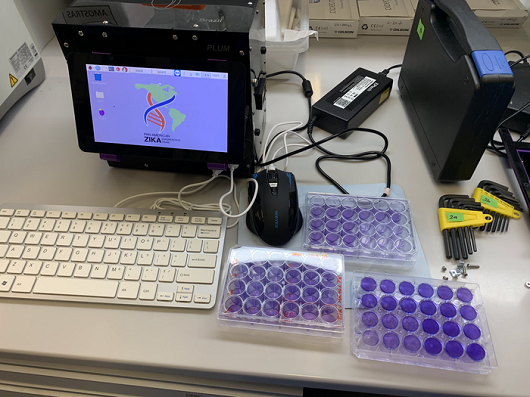Fiocruz collaborates with a Canadian innovative test for Zika
14/03/2022
Fiocruz Pernambuco (with information of the University of Toronto)
An article published in Nature Biomedical Engineering, last Monday (March 7th), reveals the potential use of synthetic biosensors in rapid, decentralized, and low-cost tests for the diagnosis of patients infects with the zika virus. The study was led by scientists of the University of Toronto (CA), who developed the sensors and the portable digital platform where samples are processed, and had the partnership of researchers from Fiocruz Pernambuco to evaluate this technique, using samples of patients from Recife (in the state of Pernambuco). It is one of the first field trials applying synthetic biology to viral diagnosis in samples of patients.
Researchers of Fiocruz Pernambuco took part in the study for its expertise demonstrated during Zika epidemic (Image: Livia Guo, LSK Technologies)
The sensitivity and specificity of the new test were equivalent to real-time PCR, which, today, is the gold standard for the detection of this and other viruses. The accuracy of these results was 98.5%, with a total of 268 samples of patients analyzed. An important technological advance of the study was the development of the PLUM equipment, which is the temperature-controlled, portable and low-cost plate reader (approximately US$500), which functions as a "laboratory in a box" and can be used even in remote regions and with few resources.
The researcher at Fiocruz Pernambuco Lindomar Pena, coordinator of the Brazilian stage of the research, highlights the innovative approach of the technique used, with synthetic gene networks, which do not depend on cell culture. "It is a revolutionary technology, which through this initiative we were able to incorporate it into the scientific knowledge available in Brazil," he said. As the platform is programmable, it can be applied in the recognition of other pathogens, including the new coronavirus, which is already the subject of a new study coordinated by Pena.
“Showing that the platform can be transported and accurately detect the Zika virus in samples of patients is a significant step forward in creating more affordable and decentralized tests,” says Keith Pardee, professor at the University of Toronto, project leader, who brings together scientists from nine laboratories in five countries (Canada, the United States, Brazil, Colombia, and Ecuador).
The Fiocruz Pernambuco team was chosen to represent Brazil in this partnership for its expertise demonstrated during the 2015/2016 Zika epidemic, which hit Pernambuco very hard. The institution's contribution to the field trials of this
interinstitutional research involved the Departments of Virology and Experimental Therapy - where Lindomar Pena operates and the blood, saliva and urine samples collected in humans were tested - and Entomology - where the team led by the researcher Constância Ayres performed tests with mosquito samples.




